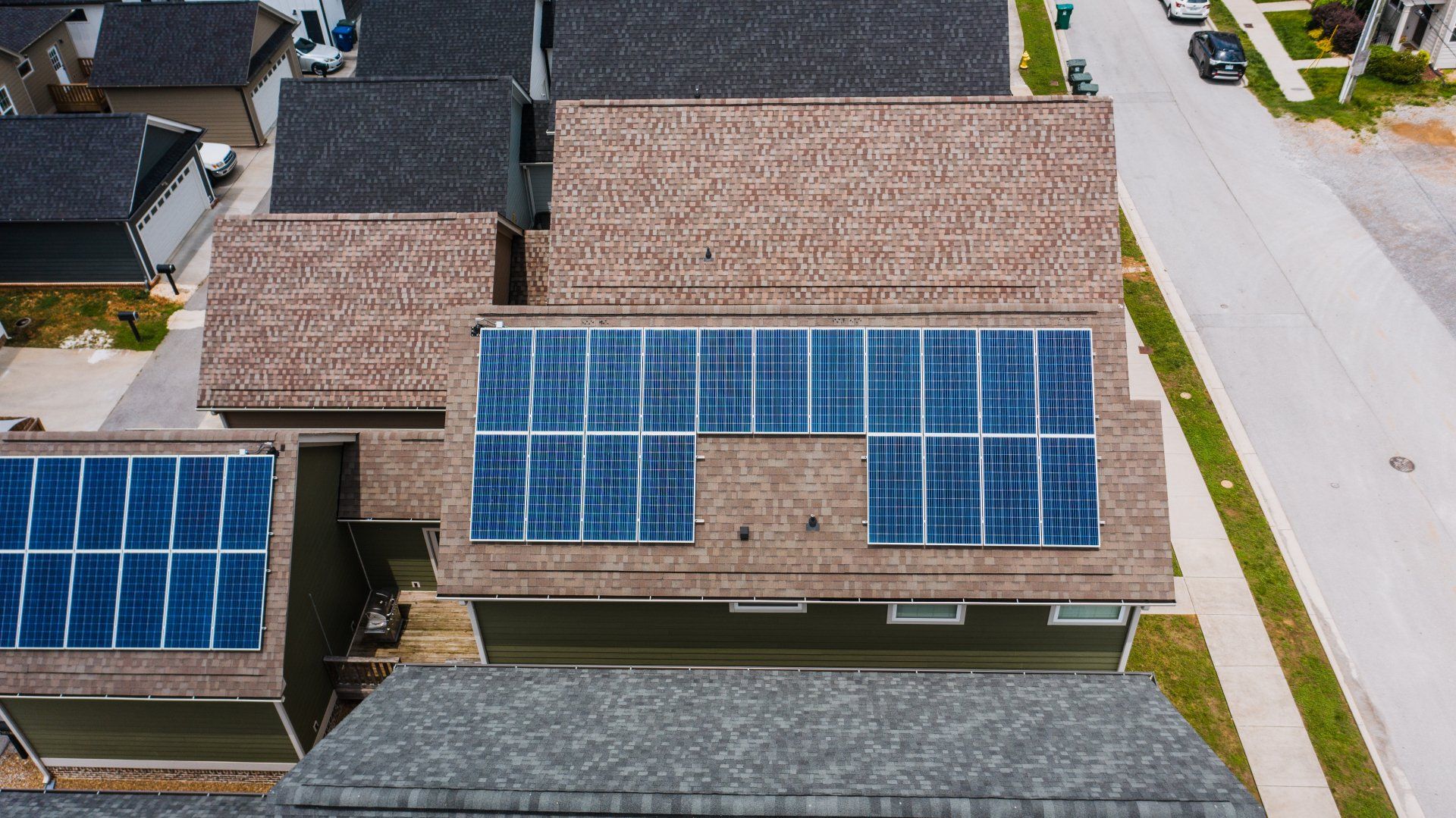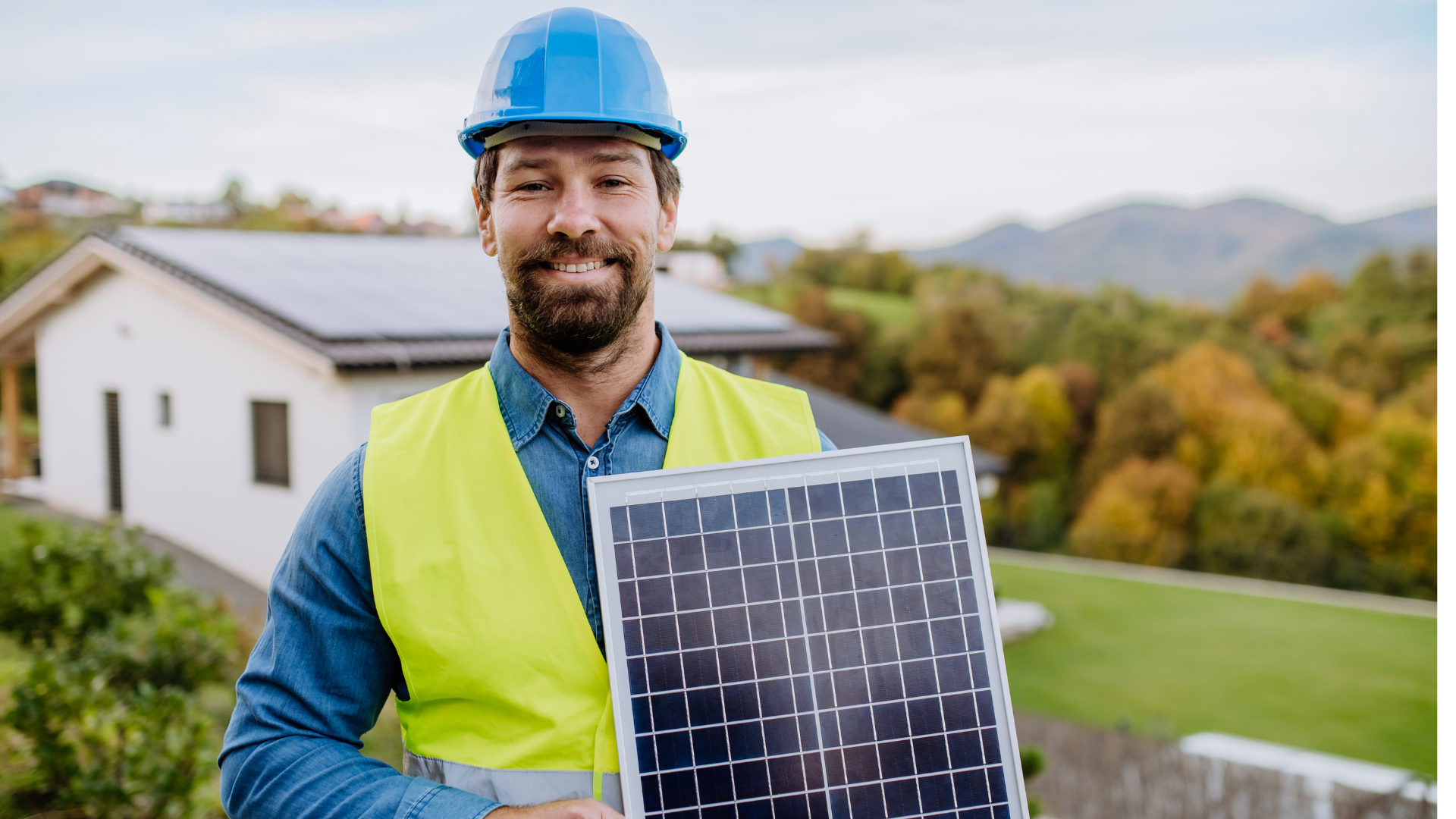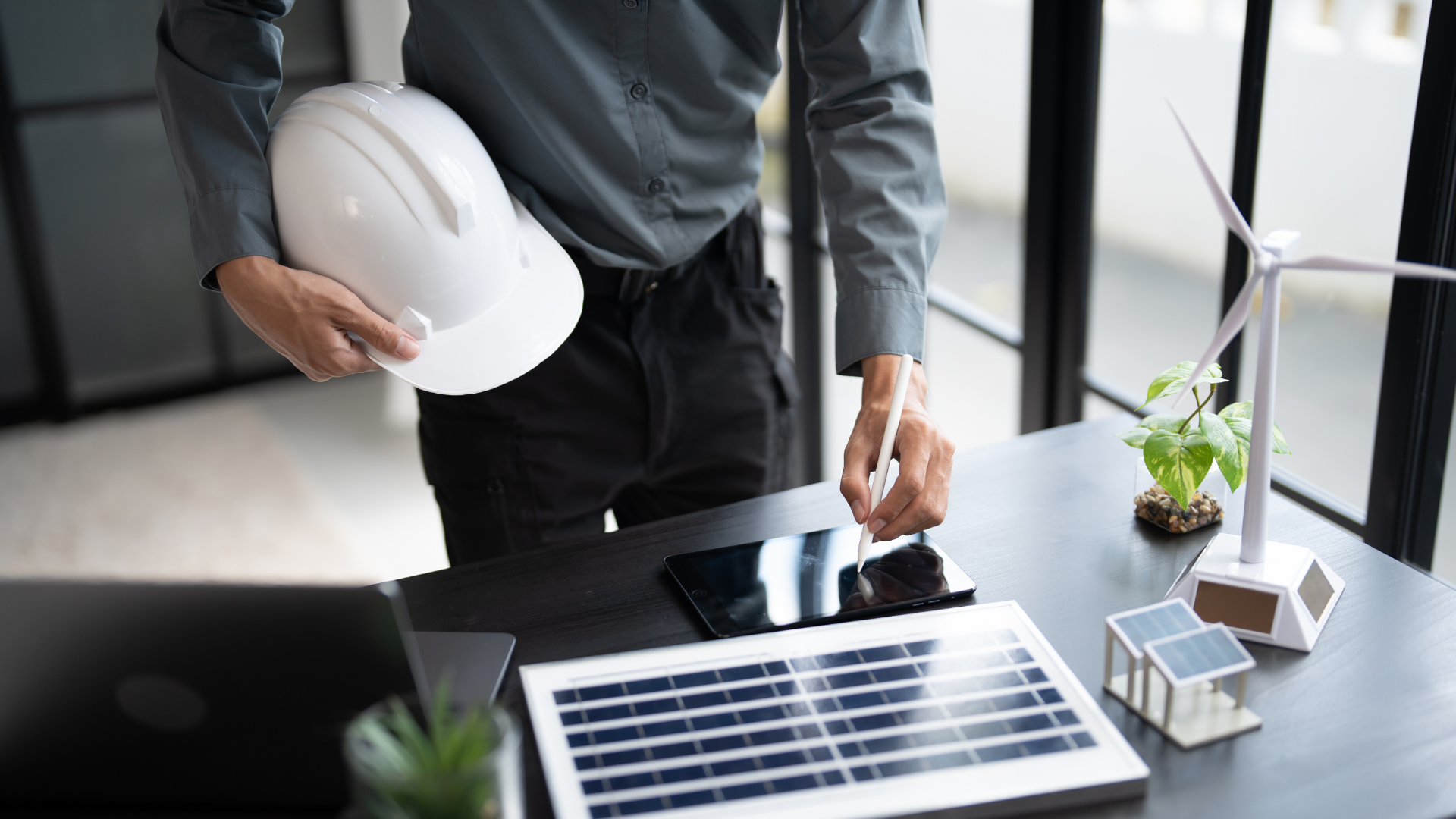November 6, 2023
Do Solar Panels Add Value To Your Home?
In a world where sustainable living is gaining momentum, the decision to install solar panels on your home is not just about harnessing the power of the sun—it's also a smart investment. But the big question on everyone's mind is, how does a solar-powered home benefit? In this article, we'll take a closer look at the fascinating intersection of clean energy and property value, providing you with the insights you need to make an informed decision about the future of your home and the planet. Let's embark on this solar-powered journey to uncover the truth!
So, does adding solar systems increase the value of your home? Keep reading to find out!
Types of Solar Panels
Before we get into the value of solar panels, it's important to understand the different types of solar panels available on the market. There are three main types of solar panels:
Monocrystalline silicon: Monocrystalline silicon solar cells are made from a single piece of silicon crystal. They are more efficient than other types of solar panels and they also have a longer lifespan.
Polycrystalline silicon: Polycrystalline silicon solar cells are made from multiple pieces of silicon crystal. They are less efficient than monocrystalline silicon solar cells, but they are cheaper to produce.
Thin-film photovoltaics: Thin-film photovoltaics use a thin layer of PV material to convert sunlight into electricity. They are the least efficient type of solar panel, but they are also the cheapest to produce. Now that we know the different types of solar panels available, let's talk about the cost of installation of these solar panels.

Cost of Solar Energy System Installation
The cost of installing a solar energy system varies depending on the size and type of system you choose. The average cost of a solar system in the United States is around $16,800. The cost of installation can be broken down into three main categories:
- Cost of the solar panels
- Cost of the inverter
- Cost of labor
Solar Panel Prices
Solar panel prices have been going down and are expected to keep falling.
In 2010, a type of solar panel called monocrystalline silicon cost $76.67 per watt. Now, in 2023, it costs only $1.50 per watt.
Another type, polycrystalline silicon, was $74.80 per watt in 2010, but in 2023, it's down to $1 per watt. There's also thin-film solar panels that used to be $86.67 per watt in 2010, but they're now just $0.75 per watt in 2023.
Looking ahead to 2024, we expect solar panel prices to continue dropping. Monocrystalline panels might go down to about $1.20 per watt. Polycrystalline panels could reach $0.80 per watt, and thin-film panels might even go as low as $0.60 per watt. These lower prices, along with the environmental benefits of solar energy, make solar power an even more attractive and sustainable option for the future.
Inverter Prices
The price of inverters has also been falling for years and is expected to continue to fall in the future. The price of a typical residential solar inverter has fallen from around $900 in 2010 to around $300 today.
Labor Costs
The cost of labor can vary depending on the installer you choose and the location of your solar installation. On average for the US, solar panel installers charge labor costs of 75 cents to $1.25 per watt for their work and expertise. Therefore, for the installation of a 5kW solar energy plant, the labor charges would cost around $3,000. Other than these there is a maintenance cost that needs to be taken into account
Maintenance Cost
Solar energy systems require very little maintenance and usually have a lifespan of 25-30 years. The average cost of maintaining a solar energy system is around $100 per year.
Enough about these costs, installing a solar power system is an investment and eventually, generating solar power through your solar energy systems installed, will save you a lot of money!
How much money can you save with solar panels?
Solar panels can save you money in two ways:
- By reducing your electricity bill
- Earning money through government incentives
Reducing Your Electricity Bill
Solar panels save your energy costs by offsetting the cost of the electricity that you would have otherwise had to purchase from your utility company. The amount of money that you save on your electricity bill will depend on the size of your solar panel system, the amount of sunlight that hits your location, and the price of electricity in your area.
Government Incentives for Solar Energy
The United States federal government offers a tax credit to the citizens who install solar energy systems. This tax credit is called the Investment Tax Credit (ITC) and it allows you to deduct 26% of the cost of installing a solar panel system from your federal taxes.
The ITC is not the only incentive available for solar energy. Many states, utilities, and local governments offer their incentives for installing solar panels. These solar incentives can include tax credits, rebates, and discounts on electricity rates.
Solar panels are a great investment that will save you money in the long run! If you're thinking of going solar, be sure to do your research and find out what incentives are available in your area.
Do Solar Panels Add Value To Your Property?
Do solar panels make your home worth more? Well, it depends.
If you lease or have a power purchase agreement (PPA) for your solar panels, they might not increase your home's value. That's because the solar company technically owns the panels, which can make it harder to sell your home.
But if you own your solar panels, they can boost your home's value. A study conducted by Lawrence Berkeley National Laboratory has shown that homes with solar panels can sell for about $15,000 more on average and sell faster. That's because people like the idea of saving on energy bills and being more eco-friendly.
According to CNBC, for every dollar you save on energy with solar, your home's value can go up by $20. So, when you sell your house, those energy savings can mean bigger profits.
Plus, many buyers these days are looking for homes with solar panels and other energy-efficient features. So, having solar can make your home more appealing to potential buyers.
Factors that impact added value of solar panels on your home-
Solar panels can add value to your property, but it depends on a variety of factors-
- Age of the solar panel system
- Size of the solar panel system
- Location of your property
- Are they leased/ PPAs
- How much sunlight hits your location
- Price of electricity in your area
Let's talk about these points in detail!
Age of the solar panel system
It is a well-established fact that as solar panels get old their efficiency keeps on decreasing. Solar panel efficiency decreases by 2% every year approximately. This means, that the older your solar panels less attractive they will be in the eyes of potential buyers of your property that contains those solar panels. If you are selling a house with solar panels that were installed within 7 years, then for sure solar panels increase home value!
Size of the solar panel system
This is a no-brainer that if your solar panel system is big, it will add more value to your property. The larger the solar panel system, the greater the savings on energy bills and the longer lasting the solar panels will be.
Location of your property
The added value of solar panels on a home depends on whether it is in a sunny or shady spot. If you have direct sunlight for most of the day, then adding solar panels is a great investment as these solar panels increase home value and decrease your electricity bill. However, if you are living in an area where there is not much sunlight, then your solar panel installation might not be an attractive proposition in the eyes of the property buyer because they may not generate enough electricity to justify their cost and there will be a decrease in efficiency of solar panels.
Are they are leased/ PPAs?
Leasing or signing a PPA agreement for your solar panel system might have an impact on the value of your property. If you sell your home while you are still leasing the solar panels, then the new homeowner will have to take over that lease agreement. This could be a turnoff for some people and could even decrease the value of your home.
How much sunlight hits your location
Another factor that determines the added value of solar panels is how much sunlight hits your solar installation location. The more sun rays that fall on the solar panels, the more electricity they generate and vice versa.
Price of electricity in your area
The price of electricity in an area also impacts whether or not adding solar panels is a good investment. If the cost of electricity is high in an area, then installing solar panels makes a lot of sense as it will help to offset some of those high costs.
In conclusion, there are many factors that determine the added value of solar panels in your home. It is important to consider all these points before making a decision to install solar panels on your property. Solar panels can definitely increase the value of your home, but it depends on a variety of factors.
Tips for selling your house with solar panels
Selling a house with solar panels can be a daunting task, but it doesn't have to be. With the growing popularity and demand for clean energy, having solar panels on your home can actually increase its value and appeal to potential buyers.
Here are some tips for successfully selling your house with solar panels:
Highlight the cost savings: One of the biggest selling points of solar panels is the potential for cost savings on energy bills. Make sure to gather and present data on your monthly or yearly electricity costs before and after installing solar panels. This will show potential buyers the tangible benefits of having solar panels on your home and can be a major factor in their decision to purchase.
Showcase the environmental benefits: Along with cost savings, many people are drawn to solar panels for their environmental benefits. Be sure to highlight the reduced carbon footprint and renewable energy aspect of your home. This can appeal to environmentally conscious buyers and set your home apart from others on the market.
Provide information on warranties and maintenance: As with any major investment, potential buyers will want to know about the warranties and maintenance associated with your solar panels. Having this information readily available can ease any concerns and show that you have taken proper care of your solar panel system.
Offer a transferable lease or power purchase agreement: If you have a lease or power purchase agreement for your solar panels, consider offering a transferable option to potential buyers. This allows them to take advantage of the benefits and savings without having to go through the process of installing panels themselves. This can also be a selling point for buyers who may not want to commit to purchasing solar panels outright.
Provide documentation and certifications: Having all necessary documents and certifications for your solar panel system readily available can help ease any doubts or concerns from potential buyers. Certifications such as Energy Star or LEED can also add credibility to your home's energy efficiency and appeal to certain buyers.
Be transparent about any potential issues: While solar panels can be a major selling point, it's important to be transparent about any potential issues or limitations with your system. This can include shading from nearby buildings or trees, the age of the panels, or any repairs/maintenance that may be needed shortly. Being upfront about these factors can build trust with potential buyers and avoid any surprises down the road.
Work with a real estate agent experienced in solar panel sales: Working with a real estate agent who has experience selling homes with solar panels can be extremely beneficial. They will have a better understanding of how to market your home and its solar panel system, as well as potential buyers who are specifically looking for homes with this feature.
To read more about selling a house with solar panels, and problems that you might face while selling a house with a solar panel system, click here!
Does Solar Panel Affect Property Tax?
Solar panels can have an impact on your property taxes. The value of your property will increase after you install solar panels, but the amount of your tax bill will depend on the rules in your area. Some states exempt solar panel systems from property taxes, while others give a partial exemption. You should check with your local assessor to find out what the rules are in your area.
Solar panels are a great investment that will save you money in the long run! If you're thinking of going solar, be sure to do your research and find out what incentives are available in your area.
To check out tax benefits and incentives state-wise, click here!
Can solar panels hurt the resale value of your home?
It's a common question and one that doesn't have a straightforward answer. The value of solar panels depends on a variety of factors - from the size and age of your home to the local real estate market.
That said, some general trends can give you an idea of how solar panels might impact the value of your home. In many cases, installing solar panels can increase the resale value of your home by adding to its energy efficiency and "green" credentials.
Of course, it's important to keep in mind that the value of solar panels is not always guaranteed. Ultimately, it will depend on individual buyers and their preferences. So if you're thinking about installing panels, be sure to do your research and talk to a real estate agent to get the best idea of how it might impact your home's value.
Final Verdict:
In the final analysis, solar panels can be a highly beneficial addition to your home, not only providing a sustainable source of energy but potentially enhancing your property value as well. However, the degree of this value addition hinges on numerous conditions, including your location, the age and size of the solar system, the sunlight exposure, and the local electricity costs. As a homeowner, it's crucial to conduct thorough research, understand your region's policies, and make an informed decision. So, light up your homes with solar power and contribute to a greener planet!
About Sunbase
Sunbase helps solar companies succeed through a suite of Solar CRM tools! To book your free demo or an appointment contact us here!
I agree to receive marketing messaging from Sunbase at the phone number provided above. I understand data rates will apply, and can reply STOP to OPT OUT.







